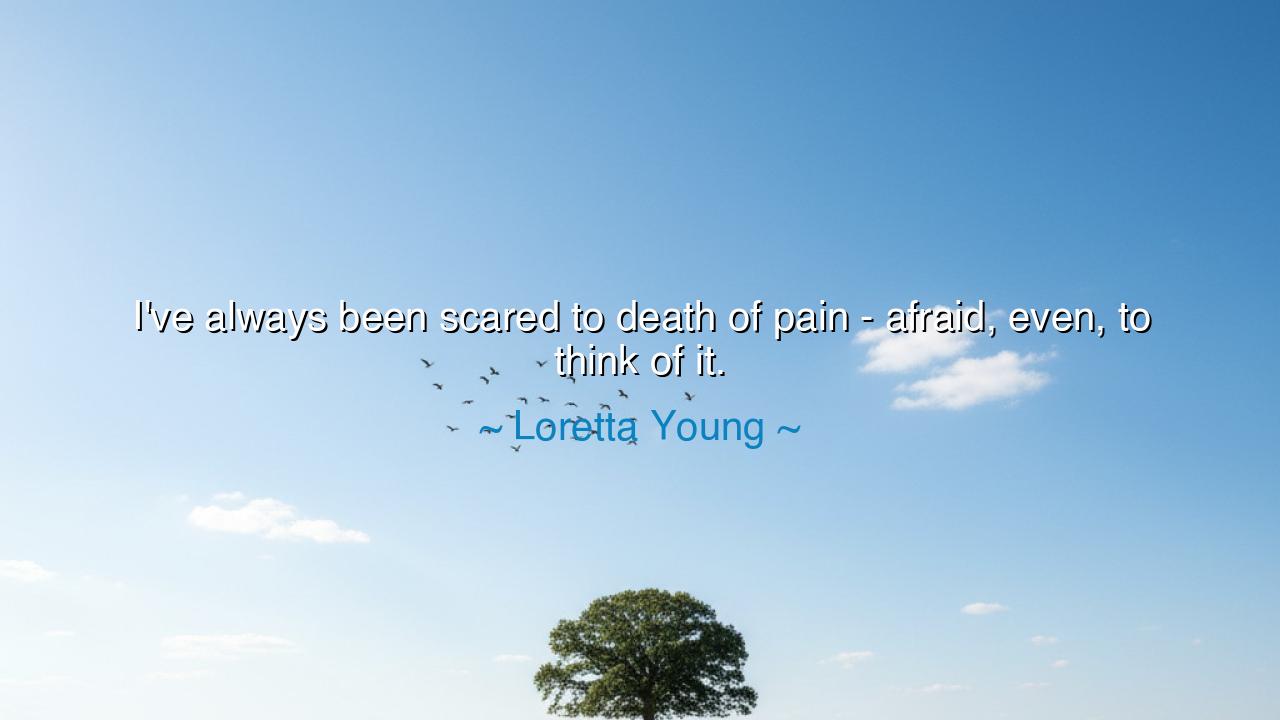
I've always been scared to death of pain - afraid, even, to think






“I’ve always been scared to death of pain — afraid, even, to think of it.” Thus confessed Loretta Young, the luminous actress whose grace on screen concealed the quiet trembling of the heart behind it. Her words, tender and human, are not those of weakness but of honesty — a rare courage, for it is no small thing to admit one’s fear. In this simple confession lies a truth as old as humankind itself: that pain, whether of body or spirit, is the shadow that walks beside every life, and that even the brave must tremble before it. Yet in that trembling, there is also the seed of strength, for to acknowledge fear is the first step toward transcending it.
Loretta Young, like so many who shone in the golden age of cinema, lived in a world that demanded poise, perfection, and the illusion of effortless grace. Yet behind the lights and laughter, she was, as all mortals are, subject to the quiet tyranny of fear — the dread of suffering, of failure, of loss. Her words remind us that pain is not merely physical; it is the weight of expectation, the ache of loneliness, the quiet wounds that life inflicts without blood. To be “afraid even to think of it” is to recognize how deeply pain dwells not just in the body but in the imagination, haunting us before it ever arrives. The mind, ever restless, makes its own sorrows long before the world does.
The ancients knew this truth well. The philosopher Seneca once wrote that “we suffer more often in imagination than in reality.” He saw that man’s greatest torment is often not pain itself, but the anticipation of pain — the dread that magnifies what has not yet come to pass. And yet, even in that fear, there is the stir of wisdom. For the one who knows his vulnerability also knows his limits, and from this awareness may be born compassion, humility, and patience. Loretta’s confession is, in this sense, not a surrender, but a mirror — showing us the common heart of all humanity, trembling before the unknown.
Consider the story of Florence Nightingale, who, as a young woman, feared the suffering of others so intensely that she could not bear to look upon a wound. Yet when the call of duty came, she faced those same wounds in the dimly lit hospitals of the Crimean War, surrounded by the cries of the dying. Her fear did not vanish — it deepened. But from that fear came a strength greater than denial: the strength to endure, to act, to heal despite trembling hands. In her, as in all who face pain without fleeing from it, the terror of suffering became the wellspring of compassion. So it is that fear, when faced, transforms not into bravery, but into mercy.
In Young’s admission, there is also a spiritual echo — the reminder that all who live must, at some time, confront the mystery of suffering. Some, like the Stoics, would seek to master it through reason; others, like the saints, would embrace it as a path to transcendence. But Loretta’s words stand apart in their quiet humanity. She does not glorify pain, nor dismiss it as illusion. She simply names it — the universal dread that all carry, yet few dare to voice. In doing so, she breaks the silence around vulnerability, showing that to be afraid is not shameful, but deeply human.
There is wisdom here for those who seek to live well. For though we fear pain, we must not let that fear rule us. The avoidance of suffering often breeds emptiness — a life too cautious to feel, too guarded to love. To live fully, one must accept the risk of being wounded, just as one must accept the certainty of loss. The heart that refuses pain also refuses joy. And so, we must learn, as the ancients taught, not to fear pain itself, but to meet it with awareness, knowing that every trial we endure refines us, and every sorrow faced with grace becomes a teacher of the soul.
Lesson: Do not despise your fear of pain; instead, listen to it. Let it remind you of your humanity, but do not let it chain you. Courage is not the absence of fear, but the decision to walk forward despite it. When pain comes, meet it gently; when it passes, let it go without bitterness. Tend to your wounds, but do not build your life around them. For even as Loretta Young feared the shadow of pain, she still walked into the light of creation, of love, of art — and that is what makes her words eternal.
So, remember this: to fear pain is to be human, but to rise despite that fear is to be alive. You need not conquer your trembling heart — only guide it. For life itself is a delicate balance between fear and faith, between the wound and the healing. And in learning to bear your pain with grace, you will find what Loretta found — that even in fear, there is the quiet strength of the soul, waiting to be revealed.






AAdministratorAdministrator
Welcome, honored guests. Please leave a comment, we will respond soon